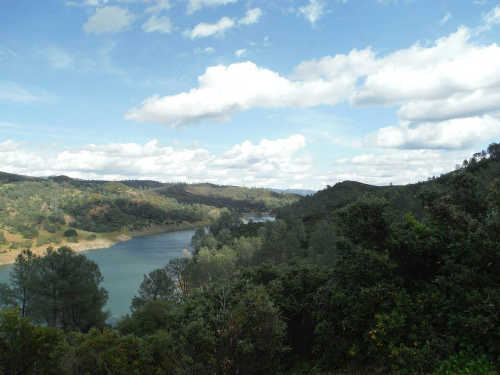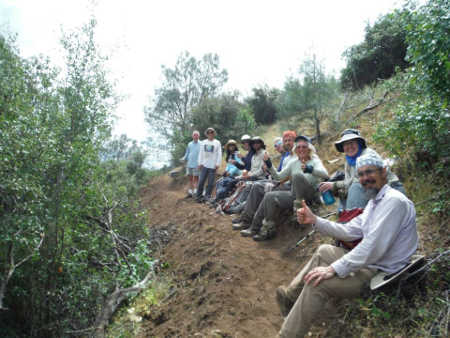This year, Memorial Day travel is expected to mark the highest number of California travelers for this holiday since 2005, according to AAA’s latest holiday travel forecast.
AAA’s travel survey projects nearly 4.4 million Californians plan on traveling 50 miles or more this Memorial Day holiday weekend.
This represents an increase of 4.6 percent from last year’s record highs.
“A stronger economy and overall lower gas prices have boosted consumers’ disposable income,” said Cynthia Harris, AAA Northern California spokesperson. “This summer travel season is starting off with great potential as many Californians are eager to take that long overdue weekend getaway.”
AAA projects that more than 3.7 million Californians will drive this upcoming holiday weekend, a 5.5 percent increase from last year.
Air travel will increase by 2.6 percent compared to 2014 figures, with just over 419,000 Californians intending to fly to their holiday getaways.
Approximately 294,000 state residents are expected to travel by other modes of transportation, such as rail, bus and watercraft. This represents a 3.4 percent decrease compared with 2014.
Nationally, AAA estimates that more than 37 million people will journey 50 miles or more during the Memorial Day weekend, representing a 4.7 percent increase compared to last year.
The AAA Leisure Travel Index shows that hotel rates at AAA Three Diamond lodgings are expected to increase by seven percent from a year ago, averaging $182 per night.
Weekend car rentals rates will average $62 per day, $19.00 more than last year. Airfares are falling two percent for the top 40 domestic flight routes, averaging $222.
AAA’s projections are based on research conducted by IHS Global Insight. The Boston-based economic research and consulting firm teamed with AAA as part of an agreement to jointly analyze travel trends during major holidays. AAA has been reporting on holiday travel trends for more than two decades.
AAA tips to avoid air travel delays
Avoid unnecessary frustration while flying by following these defensive measures:
· Avoid delay-prone flights. Before you book, make sure you’re on a flight that has a decent arrival history.
· Know your airline. Avoid airlines that are known for labor disruptions or major instances where flights have been canceled.
· Book a nonstop flight. If you fly direct, you won’t get stuck in a connecting city.
· Fly mornings. Whenever possible, book the first flight of the day. Delays tend to worsen later in the day.
· Leave enough time for connections. Schedule at least one hour for a connection. Give yourself more time if you have to change planes and go through security again.
· Use small airports. Avoid airline hubs whenever possible. Secondary airports are usually less congested and less prone to delays.
Community
- Editor
- Posted On
Cache Creek Winery hosts inaugural Aloha Run June 7
CLEARLAKE OAKS, Calif. – Cache Creek Winery is introducing the inaugural Aloha Run 5k on Sunday, June 7.
The event will take place beginning at 9 a.m. at the winery, located at 250 Long Valley Road in Clearlake Oaks.
The cost is $35 for adults and $25 for 18 and under.
The first 50 adults to sign up will be entered in a drawing for a $100 winery gift certificate.
There will be prizes for best aloha-themed participants in the following categories: adult, ages 11 to 18, 10 and under, and teams.
The day is an opportunity to enjoy some good exercise and Hawaiian food, and benefit a good cause, with all proceeds to benefit the Lower Lake High School girls basketball program.
To register visit www.active.com , or call Jennifer Hughes at 707-350-3077 or Charmaine Weldon at 707-685-5438.
WASHINGTON, DC – U.S. Rep. Mike Thompson (CA-5), chair of the House Gun Violence Prevention Task Force, won “Top Gun” honors at this week’s Congressional Sportsmen's Foundation annual shoot-out.
Thompson outshot the other 35 Members of Congress who participated.
“This annual shoot-out is a great event that brings together folks from both political parties for an afternoon of fun and comradery,” said Thompson, a two-time chairman of the Congressional Sportsmen’s Caucus and Chair of the House Gun Violence Prevention Task Force. “It was an honor to win the ‘Top Gun’ award, and I look forward to working with my fellow members of the Congressional Sportsmen’s Caucus to advance conservation, recreation and safety issues that are important to us all.”
Members of the Congressional Sportsmen's Caucus (CSC) joined the Congressional Sportsmen's Foundation (CSF) and representatives from the sportsmen's community at Prince George's County Trap and Skeet Center in Glenn Dale, Maryland, for a friendly competition of shooting rounds of trap, skeet and sporting clays.
Find more information at http://www.sportsmenslink.org/the-media-room/news/republican-vs.-democrat-congressional-sportsmens-caucus-members-compete-at .
Thompson is proud to represent California’s Fifth Congressional District, which includes all or part of Contra Costa, Lake, Napa, Solano and Sonoma counties.
- Mary K. Hanson
- Posted On
REGIONAL: The New Pope-to-Putah Trail is born

NORTHERN CALIFORNIA – An overland trail to connect Pope Creek with Putah Creek in Napa County has been in the works for a number of years, and Tuleyome successfully finished bushwhacking through this new 5.5 mile trail in April.
The new Pope-to-Putah Trail still needs a bit of finessing and signage needs to go up, but as trail building leader Eric “Bam Bam” Barnett said, “It’s a cool hike regardless.”
The trail features some panoramic views of both Pope Creek and Putah Creek along with a large meadow for picnicking.
Wild flowers are in abundance in the spring time, and there are a lot of native plants, insects, birds and other wildlife for viewing and photographing year-round.
During one excursion along the trail, for example, volunteers came across Indra Swallowtail Butterfly caterpillars in the rocky areas around the meadow.
Tuleyome Board President, Andrew Fulks, recalled: “The P2P was the first trail I worked on, where I conceived of it, designed the alignment, and then worked it through the Bureau of Land Management process for approval. It got delayed for a variety of reasons, then once I was on the Berryessa Peak Trail I didn't have time to get back on it. That's where Bam Bam came in, and he ran with it. So I'm hugely grateful to him for his dedication to finishing it!”
“I remember all the pushing through solid brush, trying to plot the route location with GPS, while having zero visibility. In particular through the 'narrows', a 200-foot wide corridor connecting the main public land blocks,” Fulks adds. “We had to be super precise in order not to trespass. After we built the trail you can see on Google Earth that we nailed the route and stayed entirely within the corridor. That was really satisfying.”
Building the trail was sometimes exhausting and treacherous: creating switch-backs, building steps, dealing with wildlife (including a happy scorpion), and bushwhacking through stands of poison oak with roots and stalks that were nearly 6-inches in diameter.
Bam Bam and his crew used a variety of hand tools and some real innovations – like having llamas carry the heavier loads on some trips, and attacking one end of the trail by canoe – to get it all done.
Barnett says it couldn’t have done without his stalwart volunteers “Rudi, Doug, Gloria, David, Jack, Curt, Dmitry, Francesca, Betsy and Robert. You guys rock!”
Tuleyome says the main take-away from this trail project is that it's part of a larger vision that Tuleyome is helping to create.
The organization saw a small block of public land and envisioned it as part of a larger regional trail system.
This trail is the first part of that system, leveraging the easy access to the public land from Pope Canyon Road, into miles of new trails for the public.
Fulks said, “We put our expertise in getting administrative approvals, together with our ability to do on-the-ground construction, to make it happen. Now, everyone can enjoy it. It's one of the major reasons why people should support our organization. We do very real and tangible things for people that they can enjoy.”
More information on the trail, photos and detailed directions to the trailhead will be going up onto the Tuleyome Web site within the next month or so at www.tuleyome.org .
Tuleyome is a nonprofit conservation organization based in Woodland, Calif.

- Editor
- Posted On
Soper Reese Theatre to feature 'Key Largo' June 9
LAKEPORT, Calif. – The 1948 suspense drama, “Key Largo,” screens at the Soper Reese Theatre in Lakeport on Tuesday, June 9, with show times at 1 and 6 p.m.
Adapted for the screen and directed by John Huston, the black and white film stars Humphrey Bogart, Lauren Bacall and Edward G. Robinson.
The story revolves around a war hero, his dead buddy’s wife and father, and how they are impacted by a ruthless gangster while waiting out a fierce hurricane.
It’s the fourth and last onscreen pairing of Bogey and Bacall.
The movie is sponsored by Kathy Jansen.
Entry to the film is by donation.
The Soper Reese Theatre is located at 275 S. Main St., Lakeport, 707-263-0577, www.soperreesetheatre.com .

- Editor
- Posted On
Western leaders gather to discuss future of forestry
NORTHERN CALIFORNIA – On Thursday the Western Forestry Leadership Coalition, in partnership with the Council of Western State Foresters concluded their 2015 Spring Meeting hosted by the California Department of Forestry and Fire Protection, or Cal Fire.
This event brought together leaders on Western forestry issues to learn about the future of forestry in a changing climate.
The two-day event attracted nearly 100 attendees from across the United States for a welcome by John Laird, California Secretary for Natural Resources and an opening keynote by Robert Bonnie, USDA Under Secretary for Natural Resources and Environment.
“The Western Forestry Leadership Coalition consistently brings together thought leaders and practitioners to discuss issues of the day,” said Under Secretary Bonnie. “This meeting was focused on fixing how wildfire suppression activities are funded, the priorities of the USDA and the Forest Service, and opportunities for collaboration to advance the goals of the Cohesive Strategy for Wildland Fire Management.”
During the 2015 Spring Meeting, attendees had an opportunity to participate in a field tour to Tilden Park, Grizzly Peak Road Scenic Overlook and a short visit to Oakland, CA to meet with community leaders working on urban forestry projects including representatives from California Urban ReLeaf.
Cal Fire representatives helped to facilitate the tour and educate attendees on the complexities of wildland fire.
“With over 33 million acres of forestland, California is the perfect place to host a gathering of the leadership dealing with the resource management challenges we are collectively facing across the Western United States,” said Chief Ken Pimlott, California’s state forester. “The meeting provided an invaluable opportunity to exchange experiences and gain fresh perspective on critical fire and forest management issues.”
Key topics of the Western Forestry Leadership Coalition, or WFLC, Spring Meeting included wildland fire, natural resources policy in the United States and USDA Forest Service priorities in the Western United States.
Other notable speakers included Jay Jensen, associate director for Land & Water Ecosystems, White House Council on Environmental Quality; Jim Ogsbury, executive director, Western Governors’ Association and representatives from key partner organizations.
“Holding the WFLC Spring Meeting in California allowed participants to discuss the impacts of the complex issues facing our Western forests,” said Alex Friend, WFLC co-lead and director of the Pacific Southwest Research Station headquartered in Albany. “Now and in the years ahead, rigorous science will play a key role in helping land managers address these issues and restore resilience in forests across the West.”
The meeting concluded with a panel highlighting Western forestry priorities, initiatives and partnerships.
Panelists included Rebecca Barnard, National Wild Turkey Federation; Tom Fry, American Forest Foundation; Nadine Block, Sustainable Forestry Initiative; and Mike Beacom, National Association of Conservation Districts.
To learn more about the Western Forestry Leadership Coalition and the Council of Western State Foresters, please visit www.wflccenter.org .
LCNews
Responsible local journalism on the shores of Clear Lake.
Memberships:
 |
 |
 |
 |
 |
 |

